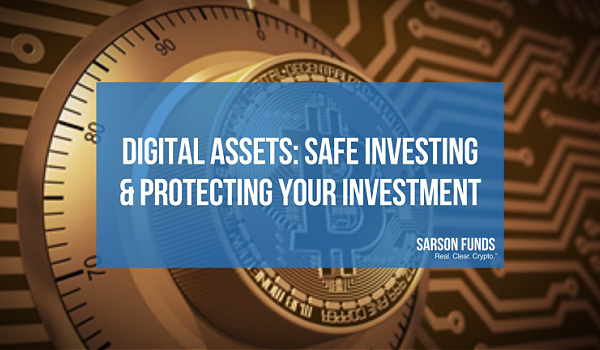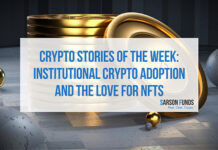By Scott Kaplan
INVESTING SAFELY
The headlines of financial crimes and scams that have been recently dominating the news are nothing new. For as long as people have agreed that things have value, others have attempted to separate those people from the valuable assets. The questions that continue to remain relevant into today’s digital age from the times when we were trading chickens for sheep are, how do we secure these assets and how can we protect ourselves?
Blockchain technology promises a high level of security through its distributed ledger system causing it to be one of the most secure data protection technologies we have available to us. At its core, the secure digital ledger system of blockchain is built to be one that cannot be ‘hacked’ or altered once the block is validated. What this means in a practical sense is that no one can just create an endless counterfeit supply of a cryptocurrency on a blockchain. It also means that no one can just steal a bunch of cryptocurrency and use it without those transactions being easily tracked.
What it DOES NOT mean is that your cryptocurrency is completely “secure” from being stolen or that your digital investment cannot lose most or all of its value in the blink of an eye.
The following tips are relevant to more traditional investing and will also provide guidance on safely investing in digital assets as well as how to secure those investments.
PASSWORD SECURITY
Passwords are our first line of defense in digital security and are required for access to almost every aspect of our digital lives. The temptation to use the same password across multiple platforms for long periods of time is understandable, but probably represents the greatest collective flaw in how most people think about personal security. Your best option is to create a unique and secure password for all of your digital accounts. Secure passwords should be 16 characters long and contain a random combination of letters, numbers and special characters. You can find a trusted third-party password manager that will both generate these sequences as well as store them for easy retrieval.
For an added layer of security, most sites now offer multi factor authentication (MFA), which will add one or more additional layers of verification to access your account. These can take the form of security questions or single use codes sent to a mobile device via text and will serve to prevent unauthorized access by someone who has managed to gain your password alone.
ONLINE SECURITY
Diversification has long been considered to be sound financial advice. We think about spreading our investments across multiple sectors and classes of financial products to protect against volatility in any one particular market. The same holds true for cryptocurrencies, and not just in terms of asset class but in terms of how you hold those assets. Despite the security efforts taken by any individual site, online wallets will always to some degree be vulnerable to hacking. To lessen the threat, we can use several different online wallets to protect against a breach of any single one.
Furthermore, using trusted online wallets or exchanges is vital. When researching different stories of recent blockchain breaches and hacks the biggest difference in the outcome to the consumer is whether or not the site was able or willing to reimburse its users for their loss. Since there is no regulatory apparatus in place to protect the investor, the credibility of the site you are dealing with is of the utmost importance.
OFFLINE SECURITY
ue to the inherent vulnerability of online trading, the safest option is to store the majority of blockchain assets in a ‘cold wallet’, or a form of offline storage without a direct internet connection. While this prevents the possibility of your investment being remotely hacked, it does create the new issue of having to secure the physical device. If you are storing $1,000,000 worth of cryptocurrency on an external hard drive, that device is now essentially a safe containing $1,000,000. Getting a physical safe to store your offline wallet is often a good idea, but bear in mind, there have been several stories over the years of people literally losing fortunes because they either lost a ‘cold wallet’ or couldn’t remember the secure password needed to access it. Always keep your cold storage as secure as possible while still being accessible to you.

All of the preceding are tips designed to help you protect your legitimate blockchain assets, but the other side of the coin when protecting your portfolio is to be able to avoid illegitimate and worthless blockchain projects. It seems like in the current climate, for every crypto or NFT project succeeding there are hundreds of others that are failures.
Just like in any market the question becomes how do we discern the winners from the losers, and just like in any market, this requires a great deal of due diligence.
Researching both the projects you invest in and the platforms that you use to facilitate these transactions is paramount. If you are investing in any sort of blockchain project without fully reading and understanding the white paper you are essentially gambling with your money.
One of the major red flags to look out for in any financial scam, blockchain or otherwise, is often an unrealistic rate of return. Meaning if an investment vehicle promises it can double your money in 6 months, there is a high probability that it may not be a legitimate investment. While blockchains have turned that notion of reasonable returns slightly on its head, the same basic concept still applies. If someone could double your money in 6 months then wouldn’t they be doing it for themselves rather than offering to do it for you for a fee?
The reality of any investment is that it is somewhat of a gamble. Whether you are structuring your portfolio to get maximum returns, or going a more conservative route to hedge against market volatility, you are trying to predict the future and grow your money as much as you think is possible. In this new digital space, your best bet is to do diligent research to understand each investment and its ultimate goal, or connect with a professional you can trust. This will allow your portfolio to grow organically into a true representation of your vision for this digital future.







